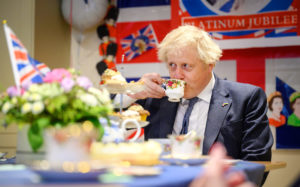“You were only supposed to blow the bloody doors off,” the markets replied to one of the most fiscally expansionary speeches a Chancellor of the Exchequer has ever given to the House of Commons. Liz Truss and Kwasi Kwarteng could not have sent a clearer message to the country and financial markets over their government’s direction of travel. It can be summarised in one word alone: growth.
“The tax cuts and reforms I’ve announced today — the biggest package in generations — send a clear signal that growth is our priority,” Kwarteng said, shining a bright light on Britain’s anaemic economic record. It would appear, however, that investors do not hold the same breezy confidence in their plans to achieve 2.5% growth per annum. The market has made its mind up: this is Liz Truss’s equivalent of Theresa May’s 2017 election gamble.
And it certainly is a gamble. Should the roulette ball fall on black, Liz Truss will go down in the history books as the swashbuckling, visionary prime minister who broke Britain free from its post-financial crash shackles. Should it fall on red, Britain’s youth will be lumped with yet more debt, and Kwarteng will see his name added to the inauspicious list of chancellors who engineered huge booms, only to later be stung by the bust that followed.
Kwarteng will be only too aware of the fate of fellow Tory chancellor Anthony Barber, who, under weak growth and, with an election only a few years away and Labour breathing down his neck, engineered the “dash for growth” with his hugely expansionary 1972 budget. After Barber turned on all the taps, inflation ran riot, peaking at 24.5%, which ultimately precipitated the February 1974 election loss for the Conservatives. Barber chose not to stand in the subsequent election and retired from frontline politics.
But scary as the Barber comparison and the financial market grumblings are, don’t take them as evidence Kwarteng’s approach is certain to fail. If we were to follow the advice of the markets and the technocrats, we wouldn’t change course from nearly two decades of abject failure. And if market prices were always right, there would be no such thing as a hedge fund — fair value would always be known and exploited, closing any arbitrage gap.
Likewise, economists, for all their preening certainty, are a fickle, quarrelsome bunch. Geoffrey Howe famously had his anti-inflationary 1981 budget excoriated by 346 economists in a letter to The Times. Each was then forced to dine on a healthy portion of humble pie as the reforms of the Thatcher government began to bear fruit, stabilising inflation and building a firm foundation for sustained economic growth.
More importantly, despite its nervous reception, there is much to be praised in this budget. Even stating that economic growth should be the top priority of government is a welcome change from the status quo — where the deficit, Brexit, and then Covid-19 took centre stage, distracting the country from its slow-motion growth crisis. With the next election looming, growth is finally being given the attention it duly deserves.
Among the measures intended to boost growth is a doubling of the stamp duty threshold from £125,000 to £250,000. First time buyers, meanwhile, will pay no stamp duty until £425,000, up from £300,000. Plenty will write this off as yet another distraction from the desperate need to actually build some houses. But in a housing supply crisis, with a limited stock of homes, the distribution of existing stock becomes even more important. As a transaction tax, stamp duty is an active impediment to older people in large family homes downsizing, and passing on a larger house with spare bedrooms to young couples with children that need them.
Other positive measures include permanently setting the rate of Annual Investment Allowance for businesses at £1 million, rather than reverting it back to £200,000 in April 2023 as had been planned. Britain’s total investment as a percentage of GDP lags well behind comparable rich nations, and encouraging growth-spurring research and development through the tax system — including suspending the planned hike in corporation tax — should be welcomed.
But perhaps the biggest danger of all with this budget is that the country simply spins its wheels in the mud. Howe’s controversial 1981 programme was not a “Thatcherite” tax-cutting budget — in fact, it substantially increased taxation to counter inflation. The economic reforms that defined the Thatcher governments and led to a stable footing for expansion were not yet complete. You cannot have your dessert until you have finished your vegetables. And yet here we are, teeth sticky with sugary tax cuts.
If growth were easy and it isn’t we would have already solved the problem. The good news is that we are not at the “growth frontier”, where more productivity can only come from cutting edge technological, medical or scientific innovation. We can steal productivity and technological improvements and catch up with economies host to greater productivity than our own. Taking best practice from abroad and implementing it at home is a tried-and-tested method for easy, cheap growth, for everything from tax structure to pedagogy.
The bad news is that much of Britain is perfectly prepared not to borrow these productivity gains and to make choices that run counter to economic growth and resultant improvements in living standards, and Truss will have to do battle with this instinct. For example, the country voted to leave the EU in 2016, leading to us departing the single market and customs union, increasing the costs of trade with our neighbours — and yet Britain now chooses to suppress net migration, running counter to the needs of sectors with worker shortages.
Happily settled baby boomers in their fully paid-off detached houses still vote in great numbers against anyone in favour of local “overdevelopment”. National infrastructure projects like new water reservoirs, airport expansions and new train lines are delayed, cut back and cancelled. It might not matter if the burden of these choices was shared equally by all, but the impact is highly unequally distributed — in favour of baby boomers. Those self-same boomers’ sons, daughters and grandchildren pay the price of these decisions in higher living costs, and lower growth.
But so does the country — high housing costs in our most productive regions and cities prevent people from moving to more productive jobs, and shovels good money into stationary and unproductive bricks and mortar. Too often this turns into an attack on the idea of London: why do you feel entitled to have affordable housing in the most productive city in the country? The only thing such pettiness leads to is lower productivity in Britain’s growth engine and therefore less tax income to spend on the regions. In effect, the government is not proud of its international financial, legal, technology and consultancy services capital. It finds its crown jewels oversized, vulgar and embarrassing.
You can’t do Thatcherism twice, we’re often told. There is nothing left to deregulate. Labour markets are reformed. Public utilities and businesses are fully privatised. Unproductive industries were shuttered for good. But planning was the one big area of state regulation Thatcher never touched.
“Later this autumn, the government will set out its vision to unlock homeownership for a new generation by building more homes in the places people want to live and work and by getting our housing market moving,” the government’s growth plan, published alongside the budget, said. “This will boost growth across the UK helping more people afford to live near good jobs.”
Yes, this is a positive sign; these are the bitter vegetables that need to be eaten for growth to flourish. But forgive a millennial who has seen it all before: under a Tory party allergic to planning reform, will these reforms actually happen? I’m not holding my breath; already there are signs of disquiet from former ministers over the high-stakes approach being taken.
And yet, Truss and Kwarteng have shown they are prepared to be deeply ideological and challenge the fragile status quo. Their economic plan may have taken a battering by the markets, but they defiantly stand by it, daring the markets to back down before they do. All they need to do is match words with deeds, and make this clear at Party Conference next week. It all seems so wonderfully straightforward — until you remember that we’ve been here before.
Disclaimer
Some of the posts we share are controversial and we do not necessarily agree with them in the whole extend. Sometimes we agree with the content or part of it but we do not agree with the narration or language. Nevertheless we find them somehow interesting, valuable and/or informative or we share them, because we strongly believe in freedom of speech, free press and journalism. We strongly encourage you to have a critical approach to all the content, do your own research and analysis to build your own opinion.
We would be glad to have your feedback.
Source: UnHerd Read the original article here: https://unherd.com/




